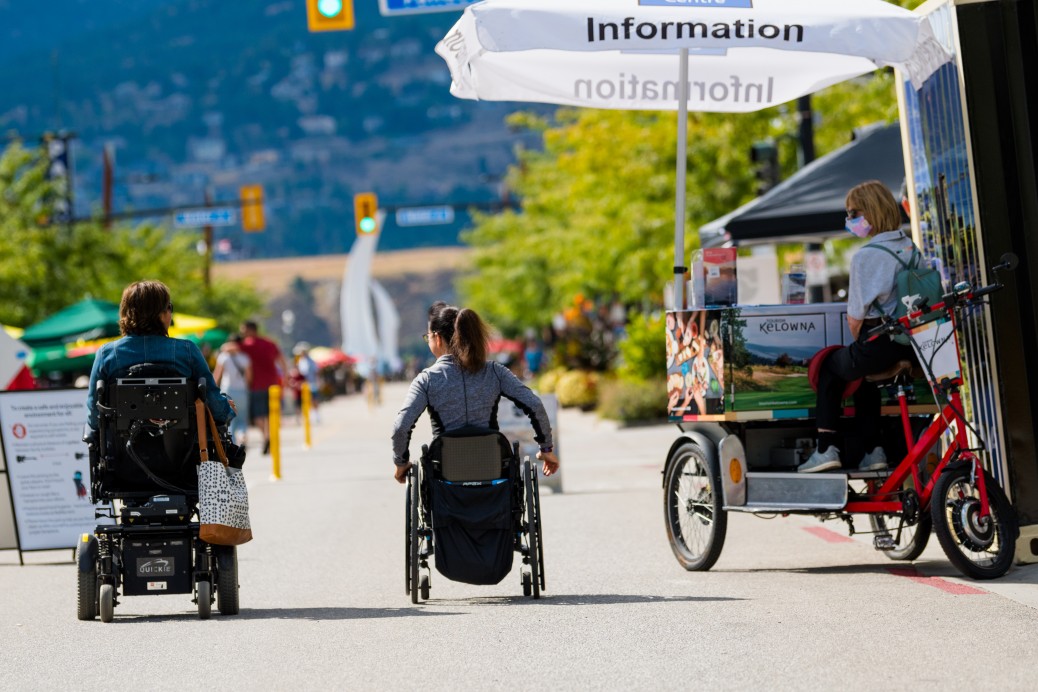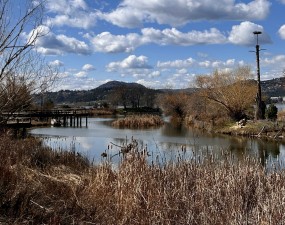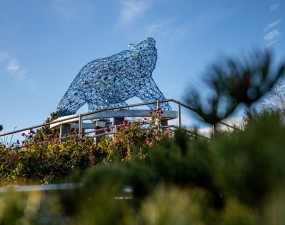Making strides toward equal access
Topics
By Mariko Siggers, Community & Neighbourhood Services Manager | May 24, 2024
Kelowna is well-known for our stunning natural beauty and vibrant community. Whether you like to explore the vast array of outdoor activities or prefer the great indoors, we have a little something for everyone. But for some residents, enjoying all that Kelowna has to offer can be a challenge. Not every amenity, program, or facility is easily accessed by all, and barriers can sometimes be made worse with the changing seasons.
The City is taking a number of critical actions in 2024 to improve accessibility. We’ve implemented a new service request option so residents can notify of us of imminent or systemic accessibility barriers that we need to address. We’re also building an accessibility plan and working collaboratively with a new Accessibility Advisory Committee. This advisory committee of Council is making recommendations on how the City can identify, remove and prevent barriers to the full and equal participation of people with disabilities. Nine members with lived experience of having a disability or supporting those with disabilities are serving up to a four-year term, in alignment with the current Council term. The Committee will use their insights and lived experience to help shape the City’s accessibility plan and improve how we respond to the accessibility barriers that are brought to our attention through the new service request channel.
While the City has made some strides in recent years to improve accessibility, including the Accessible Parking program engagement, the Community for All Action Plan and the incredibly popular adaptive recreation programs at Parkinson Recreation Centre, there is still much work to be done, and more voices to include in the conversation. In the 2022 Citizen Survey, 16 per cent of respondents said they did not agree that the City “fosters a city that is inclusive and accepting of all through its services and programs”. This kind of data demonstrates a gap in residents’ satisfaction and shows us where we can improve for those who need it most. Since our community vision includes putting people first and looking for ways to bring diverse perspectives together to collaborate, initiatives like the Accessibility Advisory Committee are a crucial piece of the puzzle that will help complete the full picture of equal inclusion for all in the future.
“My personal challenges are quite unique from many other individuals,” said Beth Flynn, one of the members of the Accessibility Advisory Committee. “I was diagnosed with the latent effects of polio called Post Polio Syndrome, which manifests in a multitude of damaged muscle tissue and destroyed nerves. My strength and mobility are severely limited and challenged. All four of my limbs are compromised and require leg braces and mobility assistance.”
Flynn’s story is just one example of the disabilities Kelowna residents live with, and there are many barriers to their everyday life that able-bodied people may never consider.
“For me, I'm a wheelchair user,” said Jeff Bourne, another member of the Accessibility Advisory Committee. “But accessibility encompasses all spectrums of disabilities, from mobility to cognitive.” There is not just one way to be disabled, and not all people with barriers to accessibility have the same story. This is why incorporating all kinds of perspectives on the committee is imperative to its success and why changes to the City’s accessibility practices will help everyone, regardless of what kind of disabilities they have.
“I wish more people would comprehend how we want to be accepted as normal individuals, with the same needs for respect, use of resources, and access [to opportunities],” said Flynn.
“People with disabilities are human. I wish our differences could be acknowledged as you would acknowledge anyone else's uniqueness.”
Being seen and understood is a key component of true inclusion. Before any kind of change can take place, we must listen to our community, especially to people like Flynn and Bourne who face barriers to daily life. This committee is critical to ensuring that all work that the City undertakes is looked at through an accessibility lens. As our city grows, we must grow too.
Bourne is sure that we’re on the right track. “I've lived in Kelowna for 35 years,” he says, “I truly believe that Kelowna can be and will be one of the most accessible cities in Canada by the year 2040.”
“The one thing I want to stress to those who don't have to think about accessibility issues, is that accessibility isn't a luxury and should not be treated as such,” Bourne says. “It is a basic human right and need.”
Learn more about the City’s commitment to a more inclusive future at kelowna.ca/accessibility.







